| Listing 1 - 9 of 9 |
Sort by
|
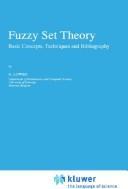
ISBN: 0792340574 Year: 1996 Publisher: Dordrecht Kluwer Academic Publishers
Abstract | Keywords | Export | Availability | Bookmark
 Loading...
Loading...Choose an application
- Reference Manager
- EndNote
- RefWorks (Direct export to RefWorks)
Mathematical logic --- Ensembles flous --- Fuzzy sets --- Vage verzamelingen --- Fuzzy sets.
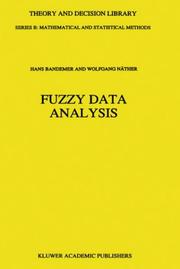
ISBN: 0792317726 9401051054 9401125066 9780792317722 Year: 1992 Volume: v. 20 Publisher: Dordrecht, Netherlands Boston Kluwer Academic Publishers
Abstract | Keywords | Export | Availability | Bookmark
 Loading...
Loading...Choose an application
- Reference Manager
- EndNote
- RefWorks (Direct export to RefWorks)
Ensembles flous --- Fuzzy sets --- Mathematical statistics --- Statistique mathématique --- Vage verzamelingen --- Wiskundige statistiek --- Fuzzy sets. --- Mathematical statistics. --- Statistique mathématique
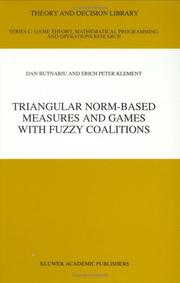
ISBN: 0792323696 9048142962 9401736022 9780792323693 Year: 1993 Volume: v. 10 Publisher: Dordrecht: Kluwer,
Abstract | Keywords | Export | Availability | Bookmark
 Loading...
Loading...Choose an application
- Reference Manager
- EndNote
- RefWorks (Direct export to RefWorks)
Ensembles flous --- Fuzzy sets --- Game theory --- Jeux [Théorie des ] --- Speltheorie --- Théorie des jeux --- Vage verzamelingen --- Game theory. --- Fuzzy sets. --- Théorie des jeux
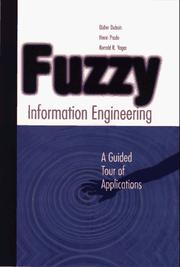
ISBN: 0471147664 Year: 1996 Publisher: New York Chichester Brisbane Wiley
Abstract | Keywords | Export | Availability | Bookmark
 Loading...
Loading...Choose an application
- Reference Manager
- EndNote
- RefWorks (Direct export to RefWorks)
Ensembles flous --- Fuzzy sets --- I/T --- ICT --- IT --- Informatietechnologie --- Information [Technologie de l'] --- Information technology --- Technologie de l'information --- Vage verzamelingen --- informatie- en communicatietechnologie --- Fuzzy sets. --- Information technology.
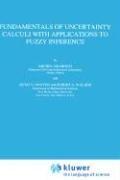
ISBN: 0792331753 9048144779 9401584494 Year: 1995 Volume: 30 Publisher: Dordrecht Kluwer
Abstract | Keywords | Export | Availability | Bookmark
 Loading...
Loading...Choose an application
- Reference Manager
- EndNote
- RefWorks (Direct export to RefWorks)
Ensembles flous --- Expert systems (Computer science) --- Expertsystemen (Informatica) --- Fuzzy sets --- Fuzzy systems --- Systemen [Vage ] --- Systemes flous --- Systems [Fuzzy ] --- Systèmes experts (Informatique) --- Vage systemen --- Vage verzamelingen --- Fuzzy systems. --- Systèmes flous --- Systèmes flous --- Stochastic processes --- Mathematical logic --- Measure theory. Mathematical integration --- Fuzzy sets. --- Expert systems (Computer science). --- Systèmes experts (Informatique) --- Systèmes experts (informatique) --- Systèmes flous. --- Ensembles flous.
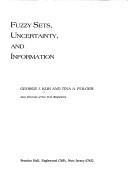
ISBN: 0133456382 0133459845 9780133459845 9780133456387 Year: 1988 Publisher: Englewood Cliffs (N.J.): Prentice Hall,
Abstract | Keywords | Export | Availability | Bookmark
 Loading...
Loading...Choose an application
- Reference Manager
- EndNote
- RefWorks (Direct export to RefWorks)
Ergodic theory. Information theory --- Mathematical control systems --- Documentation and information --- Fuzzy sets --- Fuzzy systems --- System analysis --- wiskundige statistiek --- 681.5:510.6 --- algebra --- fuzzy logic --- informatietheorie --- kunstmatige intelligentie --- regeltechniek --- statistiek --- stochastische variabelen --- systeemherkenning --- vage besluitvorming --- vage bewerkingen --- vage relaties --- vage verzamelingen --- wiskunde --- Network theory --- Systems analysis --- System theory --- Mathematical optimization --- Systems, Fuzzy --- Fuzzy logic --- Sets, Fuzzy --- Fuzzy mathematics --- Set theory --- Network analysis --- Network science --- System analysis. --- Fuzzy sets. --- Fuzzy systems. --- Ensembles flous --- Logique floue --- Information, Théorie de l'
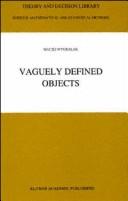
ISBN: 0792338502 0585275238 Year: 1996 Volume: 33 Publisher: Dordrecht ; Boston ; London : Kluwer Academic Publishers,
Abstract | Keywords | Export | Availability | Bookmark
 Loading...
Loading...Choose an application
- Reference Manager
- EndNote
- RefWorks (Direct export to RefWorks)
In recent years, an impetuous development of new, unconventional theories, methods, techniques and technologies in computer and information sciences, systems analysis, decision-making and control, expert systems, data modelling, engineering, etc. , resulted in a considerable increase of interest in adequate mathematical description and analysis of objects, phenomena, and processes which are vague or imprecise by their very nature. Classical two-valued logic and the related notion of a set, together with its mathematical consequences, are then often inadequate or insufficient formal tools, and can even become useless for applications because of their (too) categorical character: 'true - false', 'belongs - does not belong', 'is - is not', 'black - white', '0 - 1', etc. This is why one replaces classical logic by various types of many-valued logics and, on the other hand, more general notions are introduced instead of or beside that of a set. Let us mention, for instance, fuzzy sets and derivative concepts, flou sets and twofold fuzzy sets, which have been created for different purposes as well as using distinct formal and informal motivations. A kind of numerical information concerning of 'how many' elements those objects are composed seems to be one of the simplest and more important types of information about them. To get it, one needs a suitable notion of cardinality and, moreover, a possibility to calculate with such cardinalities. Unfortunately, neither fuzzy sets nor the other nonclassical concepts have been equipped with a satisfactory (nonclassical) cardinality theory.
Cardinal numbers. --- Fuzzy sets. --- Many-valued logic. --- Cardinal numbers --- Ensembles flous --- Fuzzy sets --- Hoofdtelwoorden --- Logic [Many-valued ] --- Logic [Multivalued ] --- Logic [Variable-valued ] --- Many-valued logic --- Multivalued logic --- Nombres cardinaux --- Vage verzamelingen --- Variable-valued logic --- Mathematics. --- Operations research. --- Decision making. --- Computer science. --- Artificial intelligence. --- Mathematical logic. --- Mathematical Logic and Foundations. --- Operation Research/Decision Theory. --- Computer Science, general. --- Artificial Intelligence (incl. Robotics). --- Logic, Symbolic and mathematical. --- Operations Research/Decision Theory. --- Artificial Intelligence.
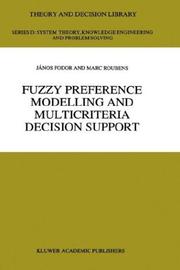
ISBN: 0792331168 9048144663 940171648X 9780792331162 Year: 1994 Volume: 14 Publisher: Dordrecht Kluwer Academic Publishers
Abstract | Keywords | Export | Availability | Bookmark
 Loading...
Loading...Choose an application
- Reference Manager
- EndNote
- RefWorks (Direct export to RefWorks)
This book provides in-depth coverage of the most important results about fuzzy logic including negations, conjunctions, disjunctions, implications and gives the interrelations between those different connectives. The work brings together multiple results about valued binary relations satisfying diverse transitivity-type conditions. The authors propose the first sound introduction to valued preference modelling through the systematic use of fuzzy set theory and functional equations and derive the possible foundations for multicriteria decision aid using aggregation, ranking and choice procedures on the basis of axiomatic results. The text presents a unified view of various multicriteria decision making tools that have been independently derived in the past, dealing with pairwise comparisons. The monograph is mathematically oriented but the results will be of the greatest interest for engineers and economists who design and implement decision support systems in practice. It is also supplied with a sufficient number of examples to make it attractive to nonspecialists.
Decision making with multiple objectives --- Décision multicritère --- Ensembles flous --- Fuzzy sets --- MCDM (Decision-making) --- Meervoudige criteria van besliskunde --- Multiattribute decisions --- Multicriteria decision making --- Multiobjective decision making --- Multiple criteria decision making --- Vage verzamelingen --- Fuzzy sets. --- Multiple criteria decision making. --- Artificial intelligence. Robotics. Simulation. Graphics --- Operations research --- Decision making --- Recherche opérationnelle --- Prise de décision. --- Prise de décision --- Fuzzy systems --- Systèmes flous --- Mathematical optimization --- Optimisation mathématique --- Mathematical models. --- Modèles mathématiques. --- Recherche opérationnelle --- Prise de décision --- Décision multicritère --- Systèmes flous --- Optimisation mathématique --- Modèles mathématiques.

ISBN: 0136123341 0136114350 9780136123347 Year: 1991 Publisher: Englewood Cliffs, N.J. Prentice Hall
Abstract | Keywords | Export | Availability | Bookmark
 Loading...
Loading...Choose an application
- Reference Manager
- EndNote
- RefWorks (Direct export to RefWorks)
Artificial intelligence. Robotics. Simulation. Graphics --- Computer architecture. Operating systems --- Learning: analogies; concept learning; induction; knowledge acquisition; language acquisition; parameter learning (Artificial intelligence)--See also {681.3*K32} --- 681.3*I26 Learning: analogies; concept learning; induction; knowledge acquisition; language acquisition; parameter learning (Artificial intelligence)--See also {681.3*K32} --- Artificial intelligence --- Expert systems (Computer science) --- Fuzzy systems --- Neural networks (Computer science) --- 681.3*I26 --- Artificial neural networks --- Nets, Neural (Computer science) --- Networks, Neural (Computer science) --- Neural nets (Computer science) --- Natural computation --- Soft computing --- Systems, Fuzzy --- System analysis --- Fuzzy logic --- Knowledge-based systems (Computer science) --- Systems, Expert (Computer science) --- Computer systems --- AI (Artificial intelligence) --- Artificial thinking --- Electronic brains --- Intellectronics --- Intelligence, Artificial --- Intelligent machines --- Machine intelligence --- Thinking, Artificial --- Bionics --- Cognitive science --- Digital computer simulation --- Electronic data processing --- Logic machines --- Machine theory --- Self-organizing systems --- Simulation methods --- Fifth generation computers --- Neural computers --- Artificial intelligence. --- Intelligence artificielle --- Systèmes experts (Informatique) --- Systèmes flous --- Réseaux neuronaux (Informatique) --- Expert systems (Computer science). --- Fuzzy systems. --- Neural networks (Computer science). --- Neurale netwerken. --- Vage systemen. --- Vage verzamelingen. --- Monograph --- Systèmes flous --- Reseaux neuronaux
| Listing 1 - 9 of 9 |
Sort by
|

 Search
Search Feedback
Feedback About UniCat
About UniCat  Help
Help News
News